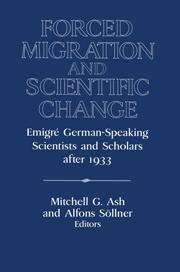Book contents
- Frontmatter
- Introduction: Forced Migration and Scientific Change after 1933
- PART ONE PHYSICAL AND MEDICAL SCIENCES
- PART TWO PSYCHOLOGY, PSYCHONALYSIS, PEDAGOGY
- PART THREE SOCIAL SCIENCES
- 8 Dismissal and Emigration of German-Speaking Economists after 1933
- 9 Emigration of Social Scientists' Schools from Austria
- 10 The Vienna Circle in the United States and Empirical Research Methods in Sociology
- 11 From Public Law to Political Science? The Emigration of German Scholars after 1933 and Their Influence on the Transformation of a Discipline
- Epilogue: The Refugee Scholar in America: The Case of Paul Tillich
- Index
8 - Dismissal and Emigration of German-Speaking Economists after 1933
Published online by Cambridge University Press: 05 January 2013
- Frontmatter
- Introduction: Forced Migration and Scientific Change after 1933
- PART ONE PHYSICAL AND MEDICAL SCIENCES
- PART TWO PSYCHOLOGY, PSYCHONALYSIS, PEDAGOGY
- PART THREE SOCIAL SCIENCES
- 8 Dismissal and Emigration of German-Speaking Economists after 1933
- 9 Emigration of Social Scientists' Schools from Austria
- 10 The Vienna Circle in the United States and Empirical Research Methods in Sociology
- 11 From Public Law to Political Science? The Emigration of German Scholars after 1933 and Their Influence on the Transformation of a Discipline
- Epilogue: The Refugee Scholar in America: The Case of Paul Tillich
- Index
Summary
The history of the institutional development of modern economics as a discipline and its intellectual history has yet to be fully investigated. What we do know comes mostly from outsiders to the “brotherhood,” who have to a great extent limited their explorations of the past to the question of how knowledge was promoted by key figures in the field. The fact that the “sciences” - as defined by Thomas Kuhn - also represent complex social processes of change, defined by a variety of factors within science and outside it, has remained unnoticed. The topic of dismissal and emigration” of economists from Nazi Germany, the turning points in their lives and careers, as well as the problems of acculturation in their adopted countries, however, can hardly be illustrated by an approach that focuses on the history of economic analysis, with its interest in the linear accumulation of knowledge.
An initial glance at the list of émigré economists reveals several peculiarities. Many of the emigrants came from the same universities. In my study on the New School for Social Research, which, in its rescue programs in the years 1933 through 1940, granted asylum to a great number of expelled scientists, I have pointed out that this institution sheltered, above all, scholars from the so-called “Kiel School” and from the University of Heidelberg. A systematic survey of the dismissals from German universities (see Table 8.1) now shows that the number of ousted scholars who later emigrated was generally the highest in the departments of economics at those two centers and at the University of Frankfurt.
- Type
- Chapter
- Information
- Forced Migration and Scientific ChangeEmigré German-Speaking Scientists and Scholars after 1933, pp. 175 - 197Publisher: Cambridge University PressPrint publication year: 1996



